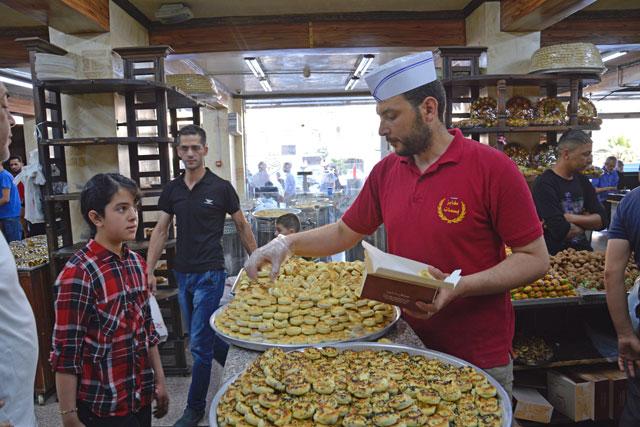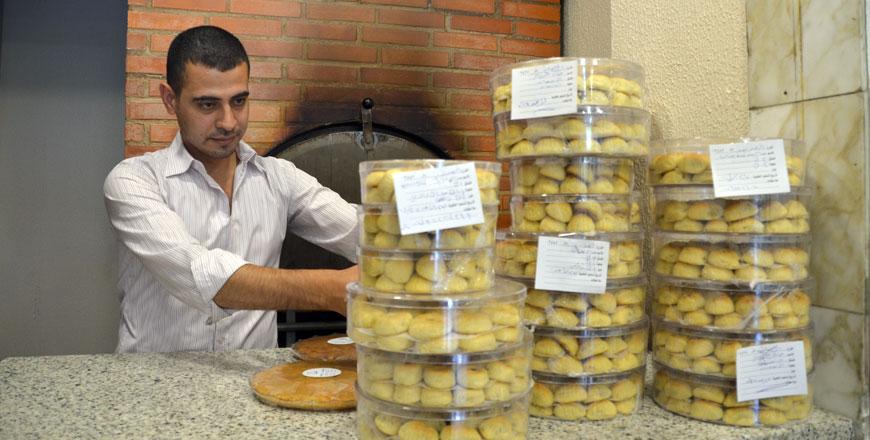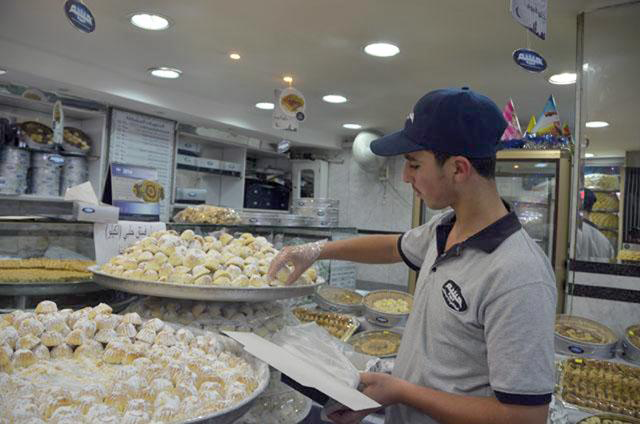You are here
Sector leaders say consumers cutting spending on sweets for Eid to organise their budgets
By Baha Abu Hasnah - Sep 11,2016 - Last updated at Sep 11,2016

To celebrate Eid, Jordanians buy traditional sweets such as mamoul, a pastry stuffed with date paste, walnuts or pistachios traditionally served to guests along with black cardamom-flavoured Arabic coffee (Photo by Amjad Ghsoun)
AMMAN — Several coinciding occasions have affected the budget of families and reduced demand for foodstuff and sweets, sector representatives said on Sunday.
Demand was expected to be higher ahead of Eid Al Adha, but the results were a shock to the trade sector in general, Foodstuff Traders Association President Khalil Haj Tawfiq told The Jordan Times.
He said the income of households may have been exhausted due to several occasions such as the start of the new school year and the preparations for Eid Al Adha, adding that this season has witnessed “the most difficult three months” for families, encompassing Eid Al Fitr, Ramadan and the summer season.
Consumer spending tends to rise during the Muslim fasting month of Ramadan, while Eid Al Fitr, the feast that follows it, is when families buy new clothes for their children and traditionally present cash gifts to them and to female relatives, known as eidiyeh.
Incomes of ordinary Jordanians barely enable them to make ends meet, so they have started to cut their spending on food, Haj Tawfiq noted.
He estimated the decrease on demand for foodstuff at between 10 and 25 per cent, compared to the same times last year, stressing that the rate of decrease differs from one area to another.
Raed Hamadah, president of the Jordan Association for Restaurants and Sweets Shops Owners, said that in addition to the challenges that families have just overcome, the demand on food and sweets in particular is expected to be lower than usually due to the priorities of every season.
In summer, people do not prefer to eat sweets, so demand tend to be limited, Hamdan said, while winter is the best season for a spike in demand on food and sweets.
To celebrate Eid, Jordanians buy traditional sweets such as mamoul, a pastry stuffed with date paste, walnuts or pistachios traditionally served to guests along with black cardamom-flavoured Arabic coffee.
An employee at a major sweets shop in Amman said demand on sweets does not exceed 35 per cent of the rates registered in the past few years.
“I still remember that there was no space to walk on the street near the shop some years ago because of the long queues, but this is not the case this year,” the Habibah shop employee told The Jordan Times.
“The situation is good, but still not as we expect. People usually buy sweets on the eve of Eid after they finish buying other things,” an employee from Nafisah sweets told The Jordan Times over the phone.
Related Articles
AMMAN — Jordanians and guests are expected to spend up to JD4 million on sweets during Eid Al Fitr holiday, including some JD1.7 million on
AMMAN – Some people are set to give up some of their long-standing traditions on the week leading to Eid Al Adha, Muslims’ bigge
AMMAN — Eid confectionery sales grew by nearly 50 per cent during the week preceding Eid Al Adha, according to stakeholders. “As



















